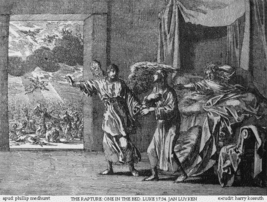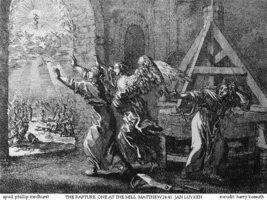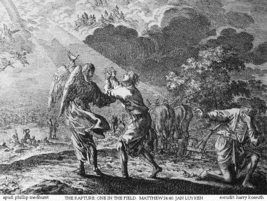
Back Wegraping AF نشوة الطرب Arabic Pagtiripon kan mga Gadan asin Buhay BCL Грабването Bulgarian Rapte Catalan Vytržení Czech Bortrykkelsen Danish Entrückung German Arrebatamiento Spanish Oramendu EU
| Christian eschatology |
|---|
| Christianity portal |
The Rapture is an eschatological position held by some Christians, particularly those of American evangelicalism, consisting of an end-time event when all dead Christian believers will be resurrected and, joined with Christians who are still alive, together will rise "in the clouds, to meet the Lord in the air."[1] This view of eschatology is referred to as dispensational premillennialism, a form of futurism that considers various prophecies in the Bible as remaining unfulfilled and occurring in the future.
The idea of a rapture as it is defined in dispensational premillennialism is not found in historic Christianity, and is a relatively recent doctrine originating from the 1830s. The term is used frequently among fundamentalist theologians in the United States.[2] The origin of the term extends from the First Epistle to the Thessalonians in the Bible, which uses the Greek word harpazo (Ancient Greek: ἁρπάζω), meaning "to snatch away" or "to seize".
Differing viewpoints exist about the exact time of the rapture and whether Christ's return would occur in one event or two. Pretribulationism distinguishes the rapture from the second coming of Jesus Christ mentioned in the Gospel of Matthew, 2 Thessalonians, and Revelation. This view holds that the rapture would precede the seven-year Tribulation, which would culminate in Christ's second coming and be followed by a thousand-year Messianic Kingdom.[3][4] This theory grew out of the translations of the Bible that John Nelson Darby analyzed in 1833. Pretribulationism is the most widely held view among Christians believing in the rapture today, although this view is disputed within evangelicalism.[5] Some assert a post-tribulational rapture.
Most Christian denominations do not subscribe to rapture theology and have a different interpretation of the aerial gathering described in 1 Thessalonians 4.[6] They do not use rapture as a specific theological term, nor do they generally subscribe to the premillennial dispensational views associated with its use.[7] Instead they typically interpret rapture in the sense of the elect gathering with Christ in Heaven right after his second coming and reject the idea that a large segment of humanity will be left behind on earth for an extended tribulation period after the events of 1 Thessalonians 4:17.[6][8]
- ^ Benware, Paul N. (2006). Understanding End Times Prophecy: A Comprehensive Approach. Chicago: Moody. p. 208. ISBN 978-0-8024-9079-7.
- ^ "Raptured or Not? A Catholic Understanding - Catholic Update October 2005". 2014-04-04. Archived from the original on 2014-04-04. Retrieved 2023-10-19.
- ^ Hays, J. Daniel; Duvall, J. Scott; Pate, C. Marvin (2009). Dictionary of Biblical Prophecy and End Times. Zondervan. pp. 692–. ISBN 978-0310571049. Retrieved 26 December 2014.
- ^ Mills, Watson E.; Bullard, Roger Aubrey (1990). Mercer Dictionary of the Bible. Mercer University Press. pp. 736–. ISBN 978-0865543737. Retrieved 26 December 2014.
- ^ Ice, Thomas. "Myths of the Origin of Pretribulationism (Part 1)". Pre-Trib Research Center. Retrieved 6 December 2019.
- ^ a b
- Guinan, Michael D. (2014-04-04). "Raptured or Not? A Catholic Understanding - Catholic Update October©2005". vatican.va. Archived from the original on 2014-04-04. Retrieved 2023-06-15.
- Coniaris, Anthony M. "The Rapture: Why the Orthodox don't Preach it". light-n-life.com. Archived from the original on 2012-11-09. Retrieved 2023-06-15.
- "Where does the Rapture fit into UM beliefs?". The United Methodist Church. Retrieved 2023-06-15.
- Schwertley, Brian M. (2013-03-11). "Is the Pretribulation Rapture Theory Biblical?". reformedonline.com. Archived from the original on 2013-03-11. Retrieved 2023-06-15.
- ^ "Free Methodist, For Jesus' Sake". Stanwood Free Methodist Church. Retrieved 9 July 2022.
Like the early Methodists, the Free Methodist Church is non-dispensational. We reject the new theology born in the late 1800s that society can only get worse, and that Jesus must return to "rapture" His people from earth to heaven. Instead, Free Methodists pray and believe that by His Spirit, God's will shall indeed "be done on earth as it is in heaven" (Matthew 6:10 NRSV).
- ^ 1 Thessalonians 4:17


